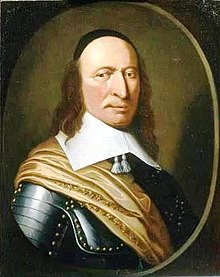Peter Stuyvesant
| Peter Stuyvesant | |
|---|---|

Painting attributed to Hendrick Couturier c. 1660
|
|
| 7th Director-General of New Amsterdam | |
|
In office 1647–1664 |
|
| Preceded by | Willem Kieft |
| Succeeded by | Office abolished |
| Personal details | |
| Born |
c. 1592 Peperga, Friesland, Netherlands |
| Died | August 1672 (aged c. 80) Manhattan, Province of New York |
| Spouse(s) | Judith Bayard (m. 1645–1672; his death) |
| Children | Balthasar Lazarus Stuyvesant Nicolaes Willem Stuyvesant |
| Parents | Balthazar Jansz Stuyvesant Margaretha Hardenstein |
| Religion | Dutch Reformed |
| Signature |  |
Peter Stuyvesant (English pronunciation /ˈstaɪv.ə.sənt/; in Dutch also Pieter and Petrus Stuyvesant; c. 1612–1672) served as the last Dutch director-general of the colony of New Netherland from 1647 until it was ceded provisionally to the English in 1664, after which it was renamed New York. He was a major figure in the early history of New York City.
Stuyvesant's accomplishments as director-general included a great expansion for the settlement of New Amsterdam beyond the southern tip of Manhattan. Among the projects built by Stuyvesant's administration were the protective wall on Wall Street, the canal that became Broad Street, and Broadway.
Stuyvesant was born around 1592 in Peperga, Friesland, in the Netherlands, to minister Balthasar Stuyvesant and Margaretha Hardenstein. He grew up in Peperga, Scherpenzeel, and Berlicum. He studied languages and philosophy in Franeker, and joined the West India Company about 1635, and was director of the Dutch West India Company's colony of Curaçao from 1642 to 1644.
In April 1644, he attacked the Spanish-held island of Saint Martin and lost the lower part of his right leg to a cannonball. He returned to the Netherlands for convalescence, where his right leg was replaced with a wooden peg. Stuyvesant was given the nicknames "Peg Leg Pete" and "Old Silver Nails" because he used a wooden stick studded with silver nails as a prosthesis.
...
Wikipedia
